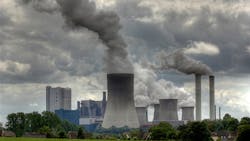IEA Warns Global Temperature Rise Set to Double Target
PARIS - The rise in the global temperature is on track to double the 2 degrees Celsius target, the International Energy Agency warned Monday, and said four policies were needed urgently to limit climate change without harming economic growth.
"This report shows that the path we are currently on is more likely to result in a temperature increase of between 3.6 degrees Celsius and 5.3 degrees Celsius," IEA chief Maria van der Hoeven said in a statement.
Nations have set the goal of limiting the increase in the global temperature this century to 2 degrees C at a UN summit in Durban in 2010 in order to avoid devastating climate change effects such as worsening droughts, storms, flood and sea levels.
The IEA's Redrawing the Energy-Climate Map report found that energy-related emissions of greenhouse gases, responsible for about two-thirds of the total, rose by 1.4% last year to a record level.
However the report "also finds that much more can be done to tackle energy-sector emissions without jeopardizing economic growth, an important concern for many governments," added Van der Hoeven.
It made four suggestions to help reduce energy-related greenhouse gas emissions by 8% in 2020 from what they otherwise would be according to current trends and bring climate change policies back on track.
It said half of the amount can be made from efficiency gains in buildings, industry and transport with investment costs being more than offset by savings from reduced fuel costs.
Limiting construction of least-efficient coal-fired coal plants, cutting the escape of methane gas from oil and gas extraction and reducing fuel subsidies should bring about the other half of the targeted reduction.
The IEA warned that delaying efforts to limit climate change "would result in substantial additional costs to the energy sector and increase the risk of assets needing to be retired early."
It also warned "the energy sector is not immune from the physical impacts of climate change," signaling threats from extreme weather, as well as more gradual changes such as rising sea levels.
The IEA is an analysis and policy forum for advanced industrial nations.
Copyright Agence France-Presse, 2013
About the Author
Agence France-Presse
Copyright Agence France-Presse, 2002-2025. AFP text, photos, graphics and logos shall not be reproduced, published, broadcast, rewritten for broadcast or publication or redistributed directly or indirectly in any medium. AFP shall not be held liable for any delays, inaccuracies, errors or omissions in any AFP content, or for any actions taken in consequence.
